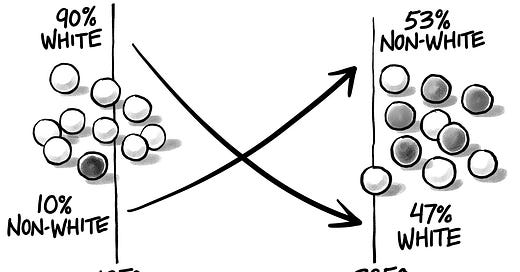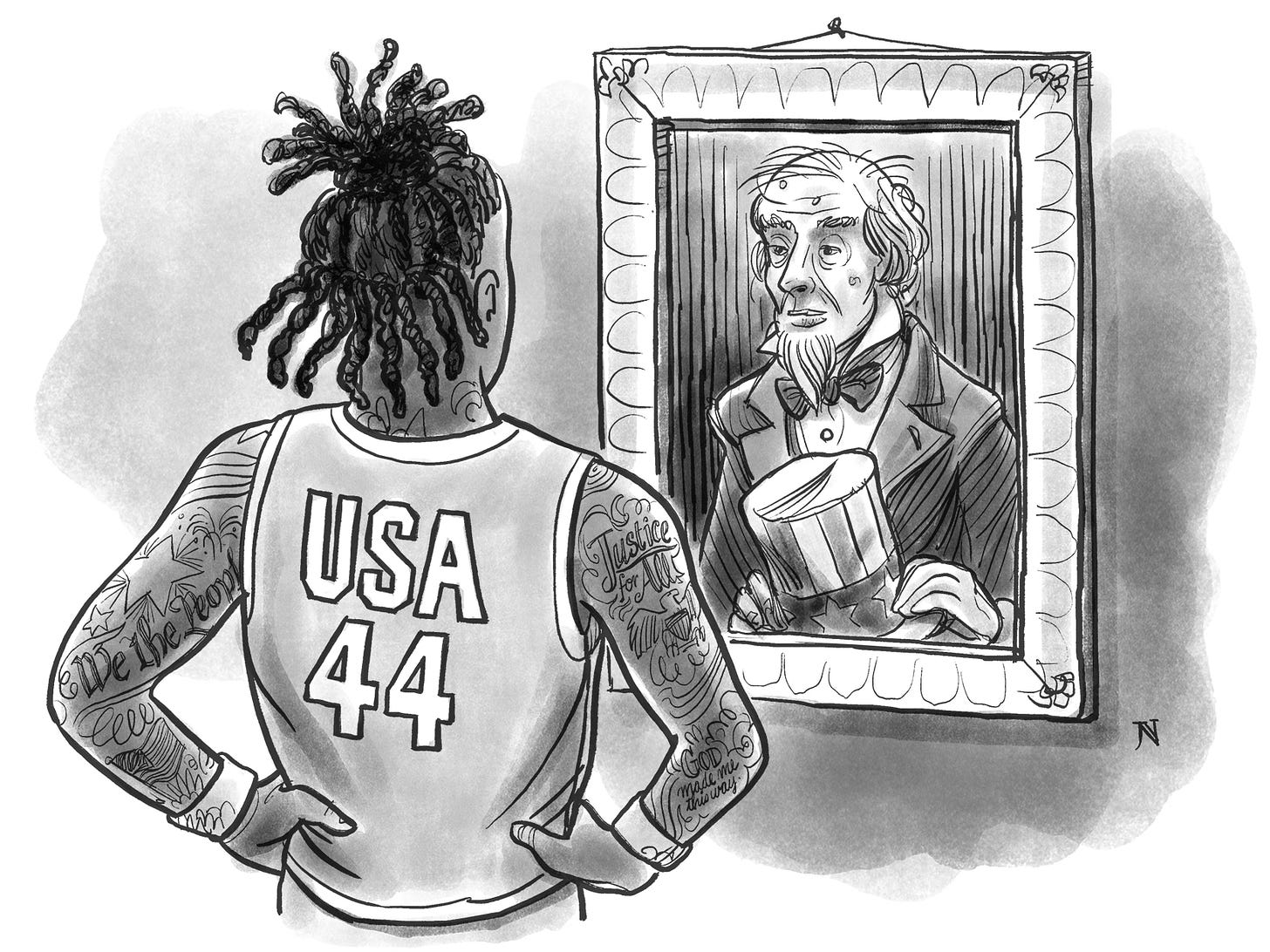The radical-acceptance election
A very uncomfortable truth is that this race is all about race
Barack Obama’s election in 2008 was not the tipping point originally imagined by those of us who took great delight in it (motivating me personally to embrace my spouse’s push to adopt two Ethiopian biological sisters a year-plus later). Instead of ushering in a post-racial American identity, it did the opposite by signaling the beginning of the end of … dare I say it? … White privilege in America.
White privilege, or white skin privilege, is the societal privilege that benefits white people over non-white people in some societies, particularly if they are otherwise under the same social, political, or economic circumstances. With roots in European colonialism and imperialism, and the Atlantic slave trade, white privilege has developed in circumstances that have broadly sought to protect white racial privileges, various national citizenships, and other rights or special benefits …
White privilege denotes both obvious and less obvious passive advantages that white people may not recognize they have, which distinguishes it from overt bias or prejudice. These include cultural affirmations of one's own worth; presumed greater social status; and freedom to move, buy, work, play, and speak freely. The effects can be seen in professional, educational, and personal contexts. The concept of white privilege also implies the right to assume the universality of one's own experiences, marking others as different or exceptional while perceiving oneself as normal.
Ouch! Am I right? Because it’s hard for me — being completely honest — to realize that my enduring “luck” in life wasn’t automatically my due.
I, being a middle-aged White guy, naturally recoil when confronted with this notion, even as I know, at my core, that it is essentially true: I can easily count up the great number of times I “got away” with something overwhelmingly because I was White — and I mean multiple times I could have easily been arrested by the cops as a young Black male doing exactly what I was caught doing by them (and yet, inexplicably wasn’t). I don’t feel any personal guilt per se, more a responsibility to accommodate something better emerging over time.
Now, when one uses that term White privilege, it automatically sounds anti-White, which, among wide swaths of our population, immediately translates into anti-Americanism (You hate this country[!] is a notion I regularly encounter), when, of course, I am almost absurdly devoted to the “religion” that is Americanism.
That’s a natural fear-threat reaction, and it works similarly to Marx’s idea of class consciousness: a recognized set of beliefs that persons hold regarding their social class or economic rank in society, including the structure of their class and their common class interests — except here it’s about the centrality of Whites within America’s national identity and power structures (with the poor cast mostly as non-Whites and the dastardly elite mostly fingered as “globalist” Jews — neither concept being at all accurate).
Obama’s election, then, coming as it did amidst the Great Financial Crisis of 2008 and subsequent Great Recession, merged with several “great awakenings” of that moment in history. These widespread, almost class-conscious-like realizations include:
America’s White identity being subsumed within a multicultural one — in a historical blink of an eye (my lifetime, basically)
America’s Christian identity likewise being subsumed within a more fractured, increasingly unchurched religious landscape (secularism run wild in a nation “chosen” by God! — the ultimate arrogance and privilege-mongering)
America’s middle class identity feeling hollowed out and threatened by an increasingly cyber-based economic model of advance, leaving us mere mortals subject to the rule of rich, tech-controlling oligarchic elements with their AI and robots and singularity promising them immortality (see most Hollywood future dystopia movies of today and really stretching back to the 1980s)
America’s longtime (1945-2008) market-making/military Leviathan role within the global system now being subsumed within a multipolarity that features several superpowers (China, India, Russia, EU) all believing themselves to be America’s equal on some level and thus increasingly willing to act on that basis (“They” forming their own groups, scheming their own reserve currency, thumbing their noses at US efforts to still rule the control of technology through sanctions, etc.; we, in turn, naturally viewing them as a grouped threat — to include even those ungrateful Europeans(!), deepening our discomfort all the more).
Since that 2008 turning point, additional awakenings have unfolded:
We in the US beginning to feel — accurately — that globalization’s future is one of moving away from American centrality and becoming more non-White, non-European, non-Western, non-American, non-Christian — in general, more none-us.
The reality of demographic aging across the North is now inescapable, driving fears — and actual trajectories — of depopulation, furthering our sense of vulnerability (We are losing the race — and our race! They are replacing us!)
Climate change revealing itself more and more, looking more powerful and uncontrollable by the day as it increasingly impacts our personal finances
The natural outcome of aging in the North, coupled with environmental stress across the Global South, driving immigration pressures poleward in a systematic fashion, with those pressures, now packaged up as a “border crisis,” further increasing Americans’ sense of vulnerability as they are coming to take our jobs, ruin our “good genes," eat our pets, etc.
That is a whole lot of fear and loathing and it defines our elections now. Trump is selling fear across all-of-the-above. And yes, his packaging decidedly recalls that of Adolf Hitler and Nazis in the early 1930s in Weimar Germany — almost stunningly so.
From America’s New Map:
Humanity has met this moment before.
Modern political science began with the question, Why did Germany’s Weimar Republic fail in the 1920s, ultimately fueling both Nazi fascism and the Second World War? How did such a sophisticated political design succumb so completely to dark forces suddenly beyond its control? Recall that Adolf Hitler pegged an imagined global cabal of Jewish financiers as determined to enslave and ultimately destroy the German people and their way of life.
Trump's rhetoric often mirrors that of Hitler in its use of dehumanizing language, strategic invocation of historical fears, and a tendency to frame political opposition as an existential threat. Trump’s promotion of such ideas as the enemies from within and America being an occupied nation are right out of Hitler’s playbook, his “solution” being mass deportation of immigrants — a purification of our “blood” that seeks to re-establish our national identity along the lines of White Christian nationalism (what else?).
This sort of inverted irredentism (not seeking lost “sacred lands” but re-sanctifying/purifying a lost domestic identity) promises a future of never-ending internal strife for America.
From the book:
Future historians may well ask similar questions about America—as in, Why did the world’s most successful and robust democracy fail in the 2020s? How did modern globalization’s progenitor and longtime defender suddenly succumb so completely to such anti-democratic impulses? Why did this nation choose to demonize and sabotage its wildly successful creation?
Trump’s entire vibe is: If I cannot control you, I will destroy you (political enemy, globalization, whatever …), and it most definitely fits the time and enough of our national mood/vibe to make his re-election a strong possibility, disastrous as it would end up being.
But again, we’ve been there before:
Who runs for public office under such conditions? Primarily demagogues whose boundless narcissism and existential fearmongering fuel their self-image as celebrity saviors combatting inhuman opponents. As a result, America presently endures its worst cohort of political leaders since its late-nineteenth-century Gilded Age, or at least last century’s Roaring Twenties.
Both periods witnessed technological and economic advances arriving far faster than security and political adaptations, resulting in the widespread sense of events spinning out of control. In both instances, society’s greatest talent flocked to the private sector, while public service was popularly disparaged. Both tumultuous eras eventually triggered lengthy bouts of progressive reforms by which rigged economic landscapes were aggressively regraded into less uneven playing fields, in turn replenishing America’s social optimism and political stability. Finally, each national correction was spearheaded by a New York blue blood from the same extended family—first Theodore and then Franklin Roosevelt. Both presidents successfully recast public service as a noble pursuit.
Today’s angry America has reached the same historical tipping point.
Problem is, Trump ain’t no Roosevelt.
We needed Dutch and we got Deutsch.
And yeah, it does feel like, from my liberal, multiculture-accepting perspective that we as a nation are slouching toward authoritarianism of the highest order — very much a going back trajectory.
And in our opposition, we non-Trumpists have mirror-imaged this election: embodying our hope that radical acceptance of all these world-transforming changes makes more sense than rejecting them all and retreating into ethno-nationalism and authoritarianism.
Radical acceptance means practicing a conscious effort to acknowledge and honor difficult situations and emotions. Fully accepting things as they are, instead of ignoring, avoiding, or wishing the situation were different, can be a critical step in moving through a difficult experience to experiencing more meaning
So, against the raging, aging White wannabe-dictator from the oligarchic class, we pit a Black/Asian female, daring America to confront the nature of this turning point: Do we recognize the strength of diversity or do we seek to liquidate it, fencing it off in an apartheid-like attempt at minority rule?
With Trump promising Kristallnacht-like “purges” (“one rough hour … and I mean real rough”) and mass deportations, the signaling could not be more clear: the vermin will be rounded up.
I don’t kid myself: Harris is nowhere near radical acceptance of all these transformational changes, but she is at least open to them and willing to facilitate our gradual acceptance of these looming inevitabilities that Trump promises to stop in their tracks and destroy — at whatever the cost in political repression and even political violence.
And no, Trump will not direct all this tumult anymore than Hitler did. He will simply signal the political top cover for those elements within our ranks who will radically accept his Purge-like solutions and who, like so many dangerous elements within the Third Reich, will gladly and eagerly “work toward the Fuhrer.”
Project 2025 is very much a working toward the Fuhrer model.
What drove this dour reflection on my part?
Actually, it was Stevie Nicks’ first song on SNL Saturday night. Take a listen with the captions on:
They’ll take your soul, they’ll take your power.
There is little doubt that, no matter which side wins this election, the other side will be moved to put up a fierce fight for years into the future.
For America to radically accept where the our nation and the world is today … it’s just not possible with a political elite dominated by Boomers and Xs. It’s just too big of a mental leap for them. We who accept the future need to seek out and form alliances within the upcoming native generations who have grown up in this reality and thus see no radical acceptance being required as that is simply how things are today.
But, for older generations, we get a radically distinct choice that feels existential to many of us. Nicks nicely captures that fear in her song, which, at first struck me as overwrought and then struck me more like whistling in the dark.
I have no doubt about America eventually finding radical acceptance of this world of our making. The only question is how painful the process and how long?
Voting for Harris is a supreme act of optimism and faith in America’s ability to evolve. It does indeed take courage at this moment in history when so many of our leaders are selling abject fear and hatred.
More frightening: many Americans, faced with that challenge of radical acceptance, are more than happy to … in the advice of Roy Cohn (Trump’s great teacher) … deny, deflect, and delay.
That approach, of course, has no chance of ultimately prevailing in a true democracy, which is why Trump and the alt Right are willing to destroy democracy for now in the name of radically accepting an American caesar.
Does that make it seem like this election is the most important vote of my life?
Yes, it does.










one of your best pieces
I gave up on FB. I had an easier time publishing my books in China than figuring out FB.